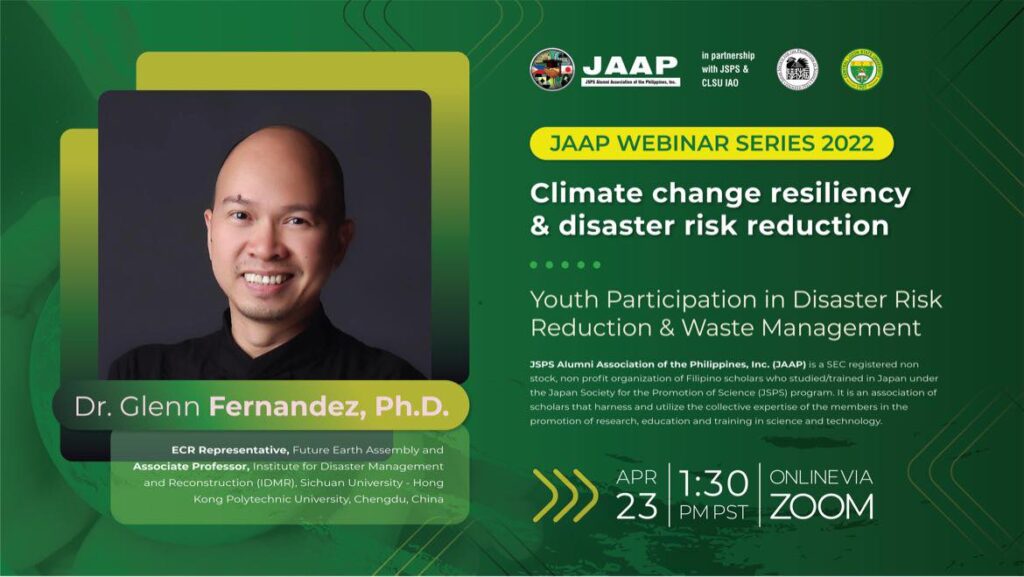2022年4月23日(土)に、JSPSフィリピン同窓会(JAAP)が日本学術振興会及びCentral Luzon State University IAOとのパートナーシップのもと、WEBINAR SERIES 2022 “Climate Change Resiliency & Disaster Risk Reduction” の第1回 Webinarを開催します。

(開催日時)
2022年4月23日(土)13:30-16:20 (Philippines time)
(講演タイトル)
Youth Participation in Disaster Risk Reduction & Waste Management
(講演者)
Dr. Glenn Fernandez, Ph.D
ECR Representative, Future Earth Assembly and
Associate Professor, Institute of Disaster Management and Reconstruction (IDMR), Sichuan University – Hong Kong Polytechnic University, Chengdu, China
以下より参加登録が可能です。
https://zoom.us/webinar/register/WN_LpIZHAj-SceEkjxi3tcsfQ
(講演の概要)
Very huge amounts of disaster waste can be produced in a very short time. For example, because of the extensive devastation in the affected provinces, the total amount of disaster waste generated by Typhoon Haiyan reached 19 million tons and overwhelmed the capacity of the affected local governments and residents to cope with the situation. This quantity is equivalent to 137% of the estimated total waste generation in the entire Philippines for 2013. If not addressed properly, disaster wastes can affect the living environment. Disaster wastes can lead to health and hygiene problems; contamination of water sources; as well as create fire risks. Disaster wastes can also hinder emergency response, recovery from disasters, and reconstruction efforts. In addition, the waste sector is the fourth largest contributor to greenhouse gas emissions in the Philippines. Effective disaster waste management can contribute to climate change mitigation. Overview of disaster waste management and information on the ongoing DWM capacity-building activities in the Philippines will be presented. Additionally, the Philippines is very highly exposed to different types of geological and hydro-meteorological hazards because of its geographical location in the Pacific Ring of Fire and along the Pacific typhoon belt. At the same time, because of the high poverty incidence, many communities across the Philippines are very vulnerable to the impacts of various hazards. Disaster risk reduction (DRR) therefore figures prominently among government priorities. Unfortunately, the Filipino youth, which comprises 20 million of the population of the Philippines, has been largely missing from DRR efforts. Research on school-based science clubs and community-based youth councils (Sangguniang Kabataan) and insights on how to support the involvement of young people in DRR will be provided in the Webinar.








